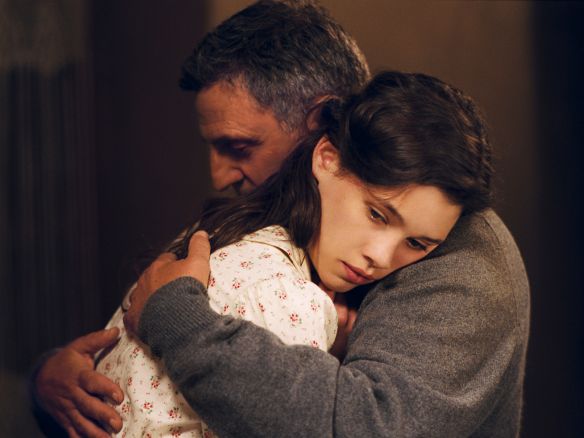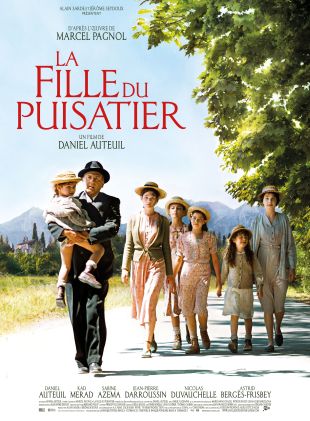
In the mid-1980s, two French dramas, Jean de Florette and its sequel, Manon of the Spring, took the film world by storm and swept up numerous Césars. Adaptations of one giant seminal novel by French writer/director/novelist Marcel Pagnol, the sagas wove an epic tale of greed, betrayal, and family loyalty in rural France.
The Well-Digger's Daughter comes billed as a follow-up to those two earlier classics, and will invite innumerable comparisons, for it has some of the same pedigree. Adapted from another Pagnol work -- this one an original screenplay that he wrote and directed in 1940 -- it was helmed by, scripted by, and stars the talented Daniel Auteuil, one of the leads in Jean and Manon. And like the prior films, this one unfolds in Southern Gaul in the first part of the 20th century and seems dominated by passionate, ardent emotions; it might just as easily be retitled "Cousin de Florette."

Àstrid Bergès-Frisbey stars as Patricia Amoretti, the 18-year-old daughter of well-digger Pascal (Auteuil). A naïve virgin with a complicated past -- her father shuttled her off to live with a foster mother for many years, following her mother's death -- this innocent waif soon catches the eye of Jacques Mazel (Nicolas Duvauchelle), a handsome pilot who is the son of a shopkeeper in the nearby town. They begin a clandestine affair, and conceive an illicit child; tragically, though, World War I soon engulfs Europe and the young man suits up and marches off to Germany to fight the Hun in the French air force. Complicated circumstances lead Patricia to mistakenly conclude that Jacques has lost interest in her, prior to his deportation. Meanwhile, the news of a romance and parentage between partners of different social classes reaches Pascal and the Mazels -- none of whom take it well.
In terms of its acting and physical production, the film cannot be faulted. The performances by Auteuil, newcomer Bergès-Frisbey, Duvauchelle, and the remainder of the cast are uniformly superb. Bergès-Frisbey does particularly excellent work; 24 at the time of shooting, and playing a character six years younger, her ability to channel a subtle array of delicate youthful neuroses and presexual trepidations holds one rapt; she enables the viewer to care. Above and beyond this, the picture benefits from cinematographer Jean-François Robin's painterly evocation of the French countryside, and an emotionally involving story.

The script is flawed, though, in its establishment of Pascal's character. He seems not simply enigmatic, but erratic, almost schizoid. In one scene, for example, he projects sympathy and understanding regarding Patricia's expectancy, then tries to do right by taking her to see Nicolas's parents; not long after, he's a venomous monster who disowns Patricia by shuttling her off to live with an aunt, and spews ignorant rage, unwilling to even acknowledge that the girl exists. Nor are we clear on the initial reasons behind Pascal's bizarre earlier decision to send Patricia off with a foster mother; this is strange and unsettling enough that it demands further elaboration beyond Pascal's one speech to a handyman friend (Kad Merad) in an opening scene that crudely sketches out the family history.
One senses -- rightly or wrongly -- that Pascal's actions and behavior may be at least partially attributable to the social etiquette and strictures of pre-WWI Europe, just as those rules (for example) guide the intolerance of Monsieur and Madame Mazel at the thought of their son impregnating a girl from the lower classes. But if this is true, it means that as screenwriter Auteuil hasn't really found an adequate way to justify the well-digger's responses and behavior toward Patricia within the context of the world in which they take place. The result is that the events of the story seem both alien and dated -- instead of recalling Jean de Florette and Manon des sources, Well-Digger seems closer to the German melodramas of Wolfgang Staudte (particularly his 1957 Rose Bernd), with their operatic tales of sin, sex, impunity, and redemption -- motion pictures that have not aged well.

That isn't to say, however, that Well-Digger is boring or particularly unpleasant to sit through -- quite the contrary. Even when we aren't sure how to account for Pascal's actions, the movie retains a fascination throughout, and as indicated, many of the other elements demonstrate professionalism and polish rare in contemporary cinema; despite its flaws, the drama exudes a beautiful poetic lyricism.
The film should serve as a warning call, however. Well-Digger is veteran actor Auteuil's debut as a writer/director, and it was reported not long after the release of this picture that he had signed a deal to direct three additional Pagnol period dramas, this time, installments of the belletrist's acclaimed Fanny trilogy, back-to-back. After watching Well-Digger, you wonder if this wasn't a less-than-optimal choice for Auteuil -- he's obviously brilliant with actors, but he might simply be better suited for scripting and directing material that takes place in a contemporary context, which doesn't require as much leg-work introducing modern audiences to period events. If that's the case, and he wants to strike the same universal chords that director Claude Berri did in Jean and Manon, he's going to have to work several times harder on these next three Pagnol adaptations to fully succeed.
